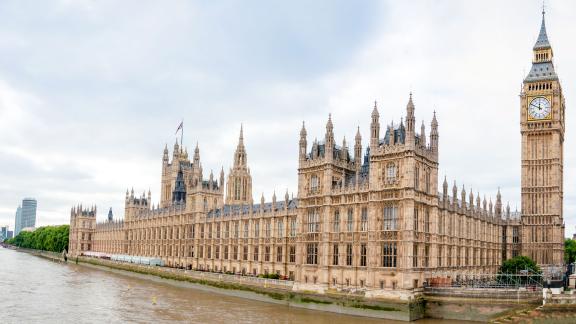King's Speech 2023: what you need to know
Key points
This year’s King’s Speech, delivered on 7 November, focused on growing the economy, strengthening society and crime reduction. Health-specific announcements included tackling smoking by raising the age of sale for tobacco products and implementing the NHS Long Term Workforce Plan, both of which we support and look forward to supporting as plans develop.
The promise to raise the age of sale for tobacco products, effectively eliminating smoking for the next generation, is an ambitious and bold health policy that has so far only been implemented in one other country. While there is further to go, we welcome this announcement as a vital first step in moving to a smoke-free generation.
But beyond this, there is little in this year’s King’s Speech for the NHS, and health leaders will be exasperated that mental health reform has again been kicked into the long grass. Parts of the current outdated Mental Health Act from 1983 not only make the lives of those experiencing a mental health crisis much harder, but also worsen health inequalities. Reform is long overdue, and this is another missed opportunity.
It was also disappointing to see the omission of a ban on so-called conversion therapy. This is another reform that would have been crucial in supporting vulnerable communities and which received widespread support from our members.

The King’s Speech signals the state opening of parliament and sets out the government’s legislative plans for the session ahead.
What was announced?
This was King Charles III’s first speech as monarch to signal the state opening of parliament and will be the last King’s Speech before the government has to call a general election. The speech sets out the government’s legislative plans for the session ahead.
The King delivered the stated aims of the government:
- growing the economy
- strengthening society
- keeping people safe.
Full details on the announcements can be found on the Gov.UK website. New proposals most relevant to the health service are listed below.
Raising the age of sale for tobacco products
- The legislation will “create a smoke-free generation”, where the legal smoking age will be increased by one year, every year.
- Therefore, children born on or after the 1 January 2009 would be unable to ever purchase tobacco products.
- This was widely expected to be included in the speech, after the Prime Minister announced his intention to propose this in front of parliament in his party conference speech in early October.
- A similar policy has already been implemented in New Zealand.
Long-term ambitions for the NHS
- Working with the NHS, the government will deliver plans to cut waiting lists and transform the long-term workforce of the NHS.
- This will include delivering on the NHS Long Term Workforce Plan.
- There was also a proposal to implement minimum service levels to prevent strikes from undermining patient safety.
The speech stated that other measures will be laid before parliament, allowing for further legislation during the session.
Analysis
The legislative agenda from the speech focused on “long-term decision making”, preparing the government’s agenda for the upcoming election campaign. These policies were most likely chosen to appear in the speech because of their impact on the general election campaign, and because of the speed in which the legislation can be drafted and passed.
From a health perspective, the reform of the Mental Health Act and banning conversion practices are glaring omissions from the speech, which will be a concern to our members. The ban on so-called conversion therapy and the draft mental health bill were included in the 2022 Queen’s Speech and both garnered widespread support from our members across the NHS.
It was positive to hear the government acknowledging the cost-of-living crisis, which is linked to worsening population health, although it is unclear what policies the government plans to take forward to address this.
The move to secure annual licensing for oil and gas in the North Sea is likely to exacerbate health issues related to air pollution, putting increased strain on the NHS.
Proposals to provide more energy efficient housing were also scrapped, exposing more vulnerable tenants to lower-quality housing, which has been demonstrated to worsen health outcomes.
Smoking
We are pleased to see a commitment to reducing rates of smoking, especially among children and young people, and to eventually phase out smoking. We have previously welcomed the government’s intention to raise the age of sale for tobacco products and crackdown on vaping, and our members the recommendations of the Khan Review: Making Smoking Obsolete to be implemented as part of our Major Conditions Strategy policy paper. Polling also indicates that the proposal has widespread support across British adults.
NHS Long Term Workforce Plan
We are pleased to see a commitment to supporting the NHS with elective recovery and workforce issues. We look forward to reviewing the detailed modelling that underpins this plan, especially in the role that integrated care systems will play in supporting the proposed reforms.
However, we are disappointed that there was not an equivalent plan laid out for the social care workforce. Our full analysis of the long-term workforce plan can be found on our website.
Regarding implementing minimum service levels during industrial action, we agree that staffing levels should ensure that the most vital services can continue to run so as not to compromise patient safety. However, to fully address the workforce needs, the government should prioritise trying to reach a compromise deal with the unions to end the industrial dispute.
Mental health bill
The NHS Confederation, alongside the mental health and learning disability sector, are disappointed that the Mental Health Act was not included in the King’s Speech today.
Parts of the Mental Health Act are now 40 years old. It was created when views and knowledge about people with severe mental illness were worlds away from how we, as a society, now view people with mental illness. Rates of detentions demonstrate clear structural disparities, especially among ethnic minorities, so this is a missed opportunity to address these issues.
The new bill would have wide-reaching positive impacts for patients, giving people more opportunities to challenge decisions made about their care, raising the bar for detention, and removing having a learning disability or being autistic as grounds for detention.
Reform of the Act was announced six years ago, and the NHS Confederation’s Mental Health Network has fed in member views and engaged with the Department for Health and Social Care throughout the process, including responding to the government’s consultation and giving evidence to the joint parliamentary committee. A draft bill was published in 2022 and pre-legislative scrutiny has been completed. Action is needed urgently to address the growing crisis in mental health.
Conversion practices
Disappointingly, the speech did not address a commitment to banning so-called conversion therapy, despite the opposite being promised in the Queen’s Speech last year. Advocates of the ban on conversion practices want a total ban with no loopholes around consenting to practices or inclusion of trans people. This is our position with our members also advocating for a ban on the practices.
Other key issues outside of the NHS that were covered in the Speech included:
Oil and gas licenses
The promise for new annual oil and gas licensing in the North Sea is not unexpected in view of the government’s recent climate policy U-turns. As part of the offshore petroleum licensing bill, the government argues that fossil fuels extracted at home are cleaner than relying on imports, so long as it imports more than it extracts. However, we are disappointed that these policies are being discussed without a proper consideration of how air pollution impacts health and the subsequent strain on the NHS. Furthermore, despite the speech re-committing the UK to being net-zero by 2050, the lack of clarity around facilitating more sustainable energy sources questions the ability for the government to reach this goal.
It is now a legal obligation for the NHS to achieve net zero by 2045, so any proposals by the government to slow down cutting carbon emissions severely impacts this statutory goal. There was also no mention of subsidising energy bills for those vulnerable to fuel poverty, which healthcare leaders have warned could lead to a public health emergency.
How we will be supporting members
Smoking
- A consultation on creating a smokefree generation and tackling youth vaping” is currently underway until 6 December. The NHS Confederation will be responding to this and will support measures that assist our members in decreasing the level of smoking-induced major conditions.
NHS Long Term Workforce Plan
- We will support members with the implementation of this plan through our networks and forums, at every level across the system.
- NHS Employers, part of the NHS Confederation, has developed a bespoke guide on key actions alongside practical resources to support implementation of this important plan.
Mental health bill
- We will continue engaging with the Department for Health and Social care to support this work through members of our Mental Health Network. We are also calling for any future government to commit to bringing forward the legislation within their first 100 days.
Net zero
- We will continue to support the NHS’s ambition to be net zero by 2045. We are currently planning a range of online events aimed at exploring how members can achieve this.



